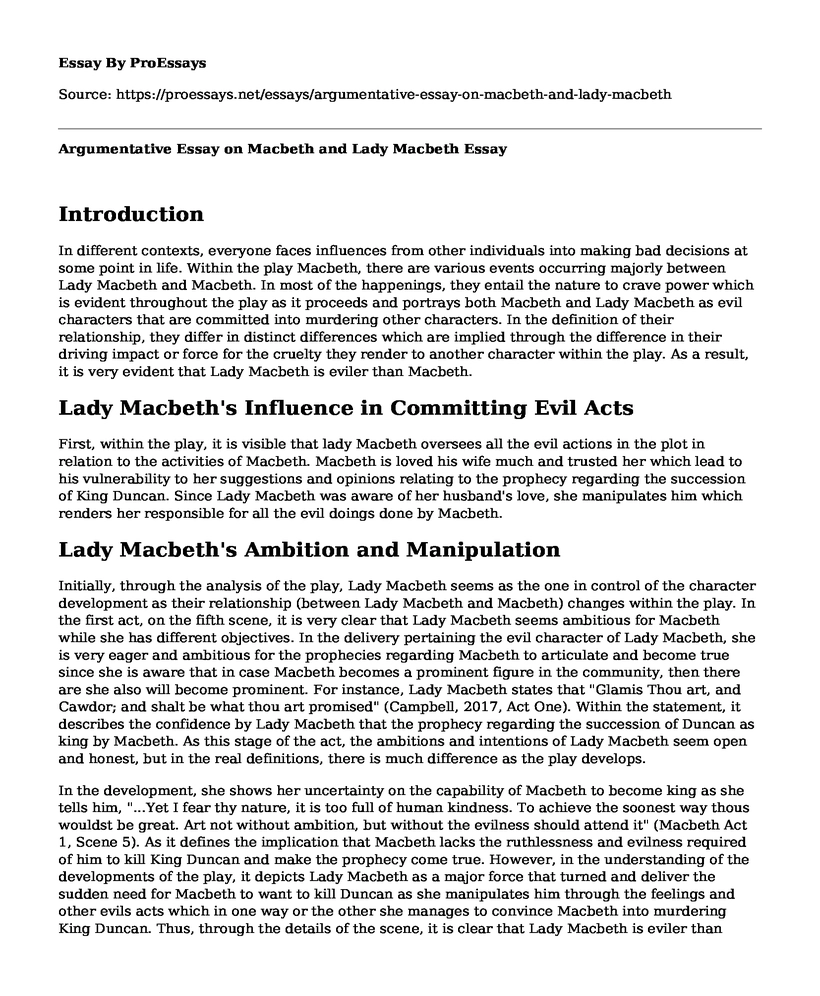Introduction
In different contexts, everyone faces influences from other individuals into making bad decisions at some point in life. Within the play Macbeth, there are various events occurring majorly between Lady Macbeth and Macbeth. In most of the happenings, they entail the nature to crave power which is evident throughout the play as it proceeds and portrays both Macbeth and Lady Macbeth as evil characters that are committed into murdering other characters. In the definition of their relationship, they differ in distinct differences which are implied through the difference in their driving impact or force for the cruelty they render to another character within the play. As a result, it is very evident that Lady Macbeth is eviler than Macbeth.
Lady Macbeth's Influence in Committing Evil Acts
First, within the play, it is visible that lady Macbeth oversees all the evil actions in the plot in relation to the activities of Macbeth. Macbeth is loved his wife much and trusted her which lead to his vulnerability to her suggestions and opinions relating to the prophecy regarding the succession of King Duncan. Since Lady Macbeth was aware of her husband's love, she manipulates him which renders her responsible for all the evil doings done by Macbeth.
Lady Macbeth's Ambition and Manipulation
Initially, through the analysis of the play, Lady Macbeth seems as the one in control of the character development as their relationship (between Lady Macbeth and Macbeth) changes within the play. In the first act, on the fifth scene, it is very clear that Lady Macbeth seems ambitious for Macbeth while she has different objectives. In the delivery pertaining the evil character of Lady Macbeth, she is very eager and ambitious for the prophecies regarding Macbeth to articulate and become true since she is aware that in case Macbeth becomes a prominent figure in the community, then there are she also will become prominent. For instance, Lady Macbeth states that "Glamis Thou art, and Cawdor; and shalt be what thou art promised" (Campbell, 2017, Act One). Within the statement, it describes the confidence by Lady Macbeth that the prophecy regarding the succession of Duncan as king by Macbeth. As this stage of the act, the ambitions and intentions of Lady Macbeth seem open and honest, but in the real definitions, there is much difference as the play develops.
In the development, she shows her uncertainty on the capability of Macbeth to become king as she tells him, "...Yet I fear thy nature, it is too full of human kindness. To achieve the soonest way thous wouldst be great. Art not without ambition, but without the evilness should attend it" (Macbeth Act 1, Scene 5). As it defines the implication that Macbeth lacks the ruthlessness and evilness required of him to kill King Duncan and make the prophecy come true. However, in the understanding of the developments of the play, it depicts Lady Macbeth as a major force that turned and deliver the sudden need for Macbeth to want to kill Duncan as she manipulates him through the feelings and other evils acts which in one way or the other she manages to convince Macbeth into murdering King Duncan. Thus, through the details of the scene, it is clear that Lady Macbeth is eviler than Macbeth and her guilt leads her into committing suicide.
Conclusion
As a counter-argument, there are many actions by Lady Macbeth that imply on her need to ensure that her husband becomes king. With the predicament, she is willing to do everything it takes to make sure that Macbeth becomes a prominent person in the society and their king. She might have rendered major manipulations to her husband; however, they are both selfish and greed through their desires for the throne (Godinez). Also, it is evident that at some point Macbeth considers himself greater than others through pride.
Works Cited
Campbell, Stancil. "Macbeth" by William Shakespeare. 2004." (2017).
Godinez, Henry Dominic. "Macbeth, Shakespeare." Macbeth, Shakespeare. 1800.
Cite this page
Argumentative Essay on Macbeth and Lady Macbeth. (2022, May 16). Retrieved from https://proessays.net/essays/argumentative-essay-on-macbeth-and-lady-macbeth
If you are the original author of this essay and no longer wish to have it published on the ProEssays website, please click below to request its removal:
- A Literary Essay on Functions of Metaphors and Similes in Gary Sotos Poetry
- The Representation of Russia and Russians in Ninotchka and From Russia With Love Essay
- Annotated Bibliography on Hamlet
- Rap Music: Is It Poetry? Essay Example
- Essay Sample on Naomi Hetherington: The Perfect Candidate for Analyzing Mary Shelley's Work
- Essay on The Odyssey: Surmounting External and Internal Enemies
- Past and the Present in the Novel the Kite Runner - Essay Sample







